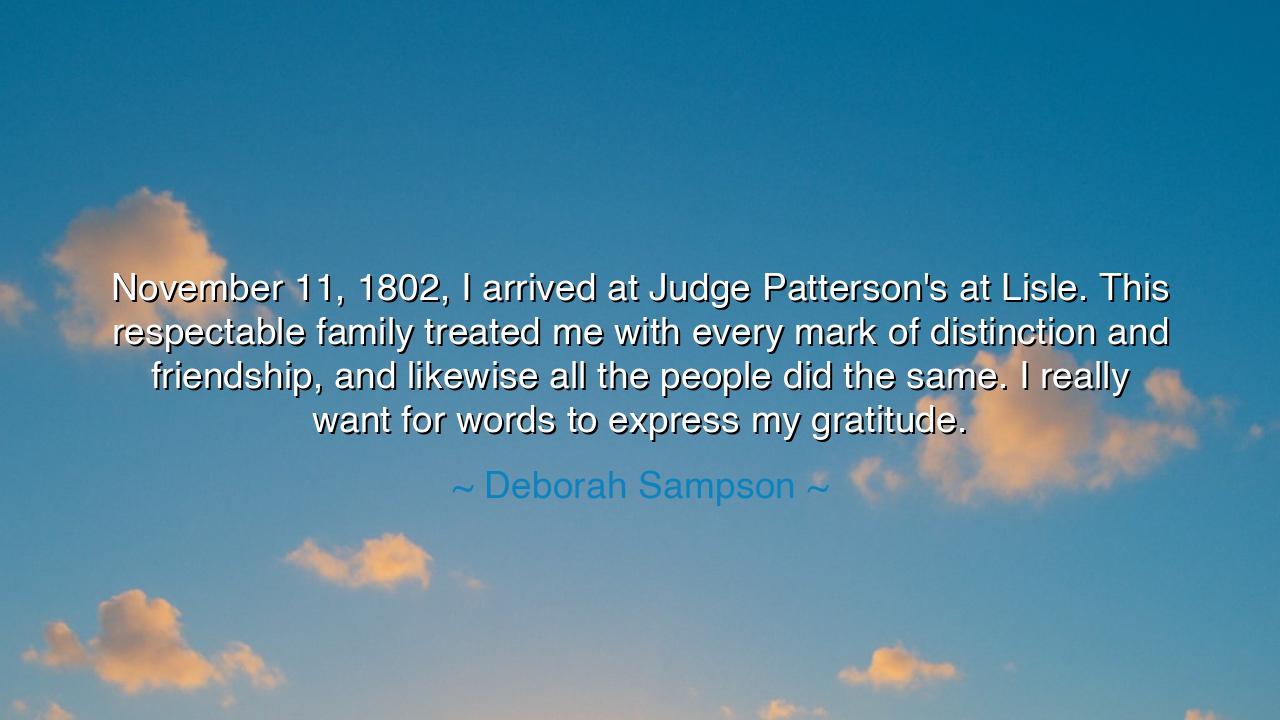
November 11, 1802, I arrived at Judge Patterson's at Lisle. This
November 11, 1802, I arrived at Judge Patterson's at Lisle. This respectable family treated me with every mark of distinction and friendship, and likewise all the people did the same. I really want for words to express my gratitude.






Listen, O seekers of the ways of virtue, to the words of Deborah Sampson, whose reflection on a single day in November 11, 1802, reveals the enduring power of friendship, gratitude, and human kindness. She recounts her arrival at Judge Patterson’s home in Lisle, where she was met with a reception marked by distinction and warmth. In her words, “I really want for words to express my gratitude,” we glimpse a heart humbled and uplifted by the generosity of others—a heart that knows the worth of human fellowship and the nobility of mutual respect.
The origin of this insight is rooted in Deborah Sampson’s extraordinary life. A woman who disguised herself as a man to serve in the Revolutionary War, she knew hardship, danger, and the harsh judgments of society. Yet, amid her trials, she encountered the enduring truth: that friendship and hospitality, extended without prejudice, carry the power to restore the spirit, to honor the courage of another, and to bind hearts in a sacred kinship. Even those who live with valor and self-sacrifice are uplifted when met with kindness that recognizes their humanity.
Consider, as the ancients might, the enduring moral of such encounters. The Greeks spoke of xenia, the sacred bond of hospitality, where hosts welcomed strangers with honor, care, and generosity, and in return, received respect and moral debt. In Deborah’s arrival at Lisle, we witness the embodiment of this principle: a respectable family and a community who, in their conduct, demonstrated the virtues of welcome, dignity, and recognition. Their actions became more than courtesy; they became a living testament to human decency.
History is filled with similar acts that echo this truth. When Harriet Tubman guided the enslaved to freedom via the Underground Railroad, she and those she aided were often met with families and communities who, risking their own safety, offered food, shelter, and encouragement. In these moments, the bonds of trust, kindness, and shared purpose became the lifeblood of survival and moral courage. Likewise, Deborah Sampson’s gratitude reflects a timeless acknowledgment that the heart remembers those who meet bravery and vulnerability with friendship and honor.
The essence of this quote is twofold: it speaks to the grace of receiving and the nobility of expressing gratitude. True friendship and communal respect are acts of both recognition and generosity. They honor the presence of another in ways that words often fail to capture, yet their impact resonates through the soul. Deborah’s struggle to find words is a testament not to inadequacy, but to the profound weight of encountering genuine care—a force that inspires reverence, humility, and a desire to give in return.
Even in the quiet moments of life, such experiences teach that we are bound to one another through simple gestures of human kindness. A warm greeting, an acknowledgment of effort, or an offering of respect can uplift spirits, foster loyalty, and inspire gratitude. These are not fleeting interactions; they are the threads from which the tapestry of enduring human relationships is woven. The ancients would say that the soul flourishes when it recognizes both the giving and receiving of goodwill, and Deborah Sampson’s reflection confirms this truth.
Let this teaching guide the actions of the heart. Seek to honor those you encounter with generosity, whether in word, deed, or spirit. When you receive kindness, acknowledge it fully, with gratitude that comes from the depth of your soul. Understand that even brief encounters can leave indelible marks upon the spirit, shaping the memory of a life lived with integrity and respect.
Thus, remember Deborah Sampson’s words as a beacon: the nobility of friendship, honor, and gratitude lies not in grand gestures, but in consistent, heartfelt recognition of the worth of others. Let your life be a testament to this principle, offering welcome and respect wherever you tread, and expressing with sincerity the gratitude that binds humanity together in bonds of lasting friendship and esteem.
If you wish, I can also craft a shorter, more dramatic version suitable for narration, emphasizing the heroism and emotional resonance of Deborah Sampson’s gratitude. Would you like me to do that?






AAdministratorAdministrator
Welcome, honored guests. Please leave a comment, we will respond soon